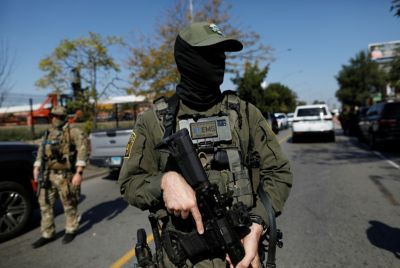Chilcot report condemns Tony Blair's rush to war when Saddam Hussein was 'not an imminent threat'
Sir John Chilcot presented a damning indictment of the British case for the 2003 Iraq invasion.
Sir John Chilcot has presented a damning indictment of the British case for invading Iraq, concluding that former Prime Minister Tony Blair's argument for going to war was based on "flawed intelligence and assessments" that "were not challenged [and] should have been."
Chilcot revealed during a speech to launch his long-awaited report on the inquiry into the case for going to war in 2003 that military action was not a last resort and that the government did not effectively plan for the future of the country after the fall of Saddam Hussein.
"It was an ingrained belief [...] that Iraq had retained a chemical and biological capability and in future [could] require a nuclear capability," he said, arguing that Blair and his allies presented the assertions "with a certainty that was not justified."
"Iraq could not have developed a nuclear weapon and it would take several years to develop and deploy long term missiles," he said.
Blair published a statement on his website immediately following Chilcot's speech arguing that "the report should lay to rest allegations of bad faith, lies or deceit.
"Whether people agree or disagree with my decision to take military action against Saddam Hussein; I took it in good faith and in what I believed to be the best interests of the country."
He added that he would respond in detail to criticisms of the planning, preparation and process of the invasion of war and its aftermath, as well as criticism of Britain's relationship with the US and with Bush.
But Chilcot claimed that while military action in Iraq may have been necessary "at some point" in 2003 "there was no imminent threat from Saddam Hussein". Chilcot said that Blair had been warned that the invasion of Iraq could increase the threat of groups such as al-Qaeda.
In the run up to the release of the report, the families of British soldiers killed during the conflict had called for Blair to face legal action for war crimes, either by the International Criminal Court or the Hague, but Chilcot did not comment on the legality of the decision.
"We have concluded that the circumstances in which it was decided that there was a legal basis for military action were far from satisfactory," he said, adding that only a court could decide if the decision was legal.
Chilcot also revealed that on 28 July 2002 Blair wrote to Bush saying that he would support his action in Iraq "whatever" - almost a year before the case was made to Britain's parliament on 17 March, 2003. He then built the case for war over eight months before it was put to the House of Commons.
Chilcot made his comments during a speech at the launch of his 2.6-million-word report into the UK's involvement in the war in Iraq.
David Cameron is due to give a statement in the House of Commons followed by Labour leader Jeremy Corbyn, who was an outspoken critic of the Iraq War in 2003 and a former chair of the Stop the War Coalition.
A total of 179 British service personnel were killed between 2003 and 2011. The number of Iraqi causalities has been estimated as high as between 150,000 and 500,000.
Some more key extracts from John Chilcot's statement:
"Blair had been advised that an invasion of Iraq was expected to increase the threat to the UK and UK interests from Al Qaida and its affiliates."
"By early March [2003], the US Administration was not prepared to allow inspections to continue or give Mr Blair more time to try to achieve support for action. The attempt to gain support for a second resolution was abandoned."
"In the Inquiry's view, the diplomatic options had not at that stage been exhausted."
"Military action was therefore not a last resort."
"The consequences of the invasion and of the conflict within Iraq which followed are still being felt in Iraq and the wider Middle East, as well as in the UK. It left families bereaved and many individuals wounded, mentally as well as physically. After harsh deprivation under Saddam Hussein's regime, the Iraqi people suffered further years of violence."
"Blair confirmed that he was 'solidly with the President and ready to do whatever it took to disarm Saddam' Hussein."
© Copyright IBTimes 2025. All rights reserved.






















